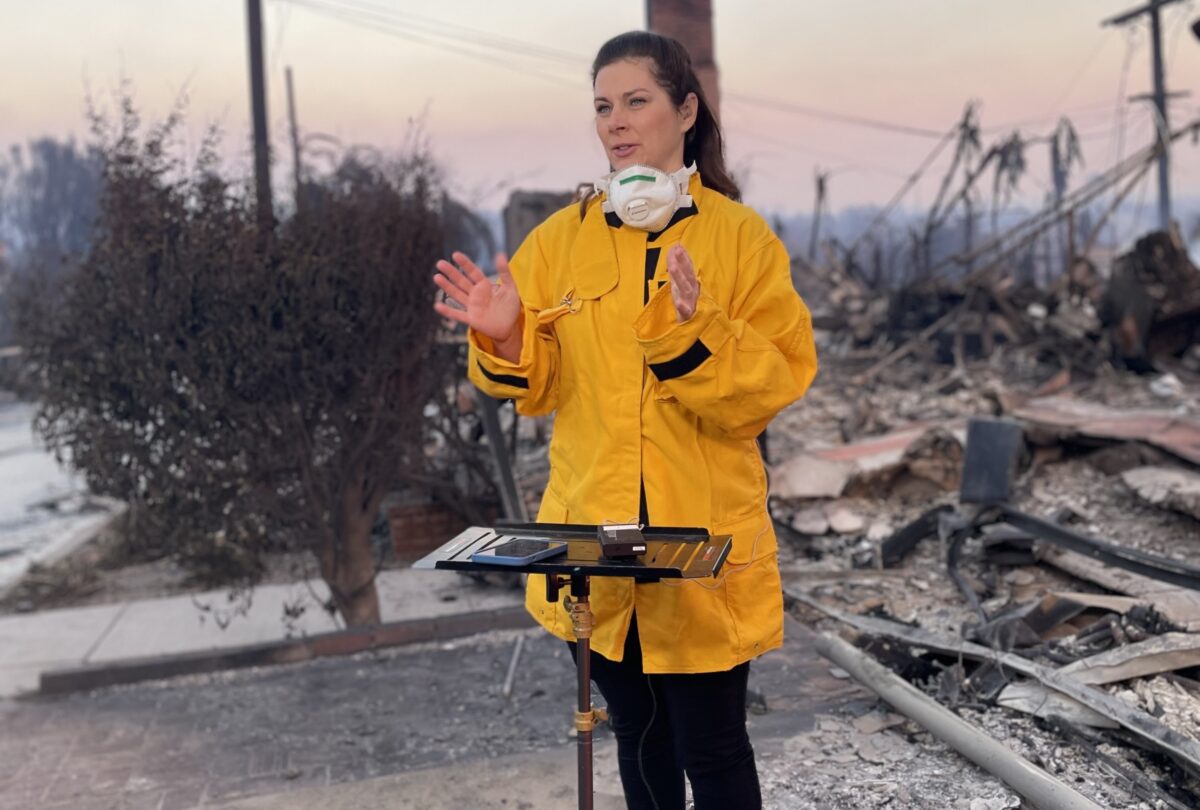Erin Burnett on Covering the Devastation of the LA Fires: ‘You Are Smelling the Destruction of Daily Life’

Photo courtesy of CNN.
Last week, as fires raged across the Pacific Palisades, Malibu, Pasadena, Eaton and other parts of Los Angeles, fueled by unexpectedly strong Santa Ana winds, CNN anchor Erin Burnett rushed to California to cover the devastating consequences of the blaze that by now has turned thousands of homes into ash, decimated entire communities, and left more than a dozen people dead.
The first thing Burnett noticed was the air. “You really recoil when you breathe it in,” she told Mediaite in an interview on Wednesday. “There’s a very palpable sense that you are smelling the destruction of daily life.”
“There’s a real awareness that every piece of ash is not a piece of wood,” she said. “For the people that live here, it’s their life that’s coming down.”
Presently, there are three active fire incidents in Los Angeles that according to state officials all started on January 7th. The Palisades Fire destroyed 23,713 acres and is 22 % contained, the Eaton Fire burned 14,117 acres, and is 55% contained, and the Hurst Fire burned 799 acres and is 98% contained. The Eaton and Palisades fires are the first and second most destructive fires in Southern California history.
CNN reported on Wednesday that Los Angeles Mayor Karen Bass cautioned that the city is “not out of the woods yet” as Santa Ana winds are predicted to uptick again, and the Red Flag warning, which indicates conditions that could increase the risk of a fire, would expire that evening.
Burnett and her crew have captured harrowing images while canvassing thousands of acres of burned land from a helicopter to filming firefighters prevent reignition of fires.
The veteran network journalist spoke about watching displaced residents return to what is left of their charred homes, an experience that Burnett said is emotionally charged.
“They gasp when they drive in,” she said. “You watch them and you’re sort of eavesdropping on an immensely raw personal moment of loss when they see what happened. There is something different between knowing that your house and home is gone and actually seeing it gone.”
The damage to the community feels indelible, she said. “The immediacy after the event here was a societal trauma that will shape this place in a tangible, forever way.”
The fires have not just leveled entire blocks of homes – many landmarks of Los Angeles, like those that once lined the majestic Pacific Coast Highway – have been obliterated. On January 9th, videos like the one posted by political analyst Dominic Michael Tripi on X show the stunning destruction of the Malibu waterfront.
Officials said at least 24 people have died as a result of the fires, and many others are missing. More than 12,000 buildings and 40,000 acres have been destroyed.
Burnett spoke with several firefighters who are still combating the fires as she gathered information about their efforts.
“They’ve been doing this, and various members of their crew for 22 to 26 years, and they’ve never seen anything like these fires ever in their careers,” she said. “They were talking about what it means that used to be fire season, it would go in March or April until October. Now, there is no fire season. It’s all year long.”
Burnett noted that the firefighters directly pointed to climate change as the catalyst for the increasing fires.
“They were very explicit that to them the climate has changed and things have changed, and it has certainly changed their lives,” she said.
Despite it all, Burnett said the firefighters she spoke with “love their jobs and they feel a palpable sense of protecting their communities.”
“One of them was saying Los Angeles is so enormous, and sometimes you don’t necessarily think of it as a community because it’s so big,” she recalled. “At this moment, everybody has stepped in and everybody is touched by it and everybody has stepped in to help in some way, shape or form.”
While reporting on the work of these firefighters, Burnett witnessed a stunning recovery that she covered on her CNN show this week.
Chien Yu, a Pasadena fire engineer, lost his wedding band when the fires burned down his Altadena home. He returned earlier this week to the lot of land where his house once stood. Burnett interviewed him about seeing his home demolished. His colleagues in the Pasadena Fire Department were adamant they would find his ring.
Burnett watched them dig with their bare hands in an effort to recover this small but meaningful band.
“These big guys are jumping in there and they start digging and then all this stuff is stirred up,” she said. “They just want to find this and they’re digging with their hands, and they’re getting pieces of rubble to dig with.”
Eventually, they found the ring.
“It was an incredible moment,” she recalled. “Just to have something so small can signify something so significant for people.”
Burnett said the media is doing a “good job” covering the historic fires and noted how this particular story is long from being over as fires are still not contained, reconnaissance is presently happening, and many communities will take years to be rebuilt. The profound impact of the fires resonated with the TV journalist as she took in the pulverized landscape; imagery that will stay with her.
“When you’re standing there looking all around, everything is destroyed. There was this one moment these birds flew over on Saturday over Palisades, and it was the first living thing that we had seen. It is bereft and devoid of life out there in the Palisades.”
She spoke of seeing Los Angeles from an aerial view, and detailed the impact of how widespread the damage was. “Seeing that fire from a distance, it looks like some sort of a massive bomb explosion. I will always remember that.”





Comments
↓ Scroll down for comments ↓